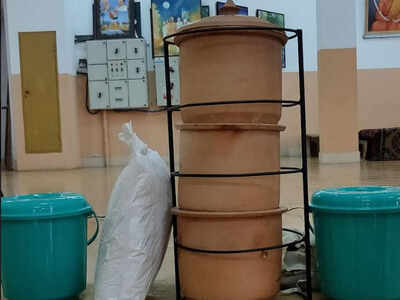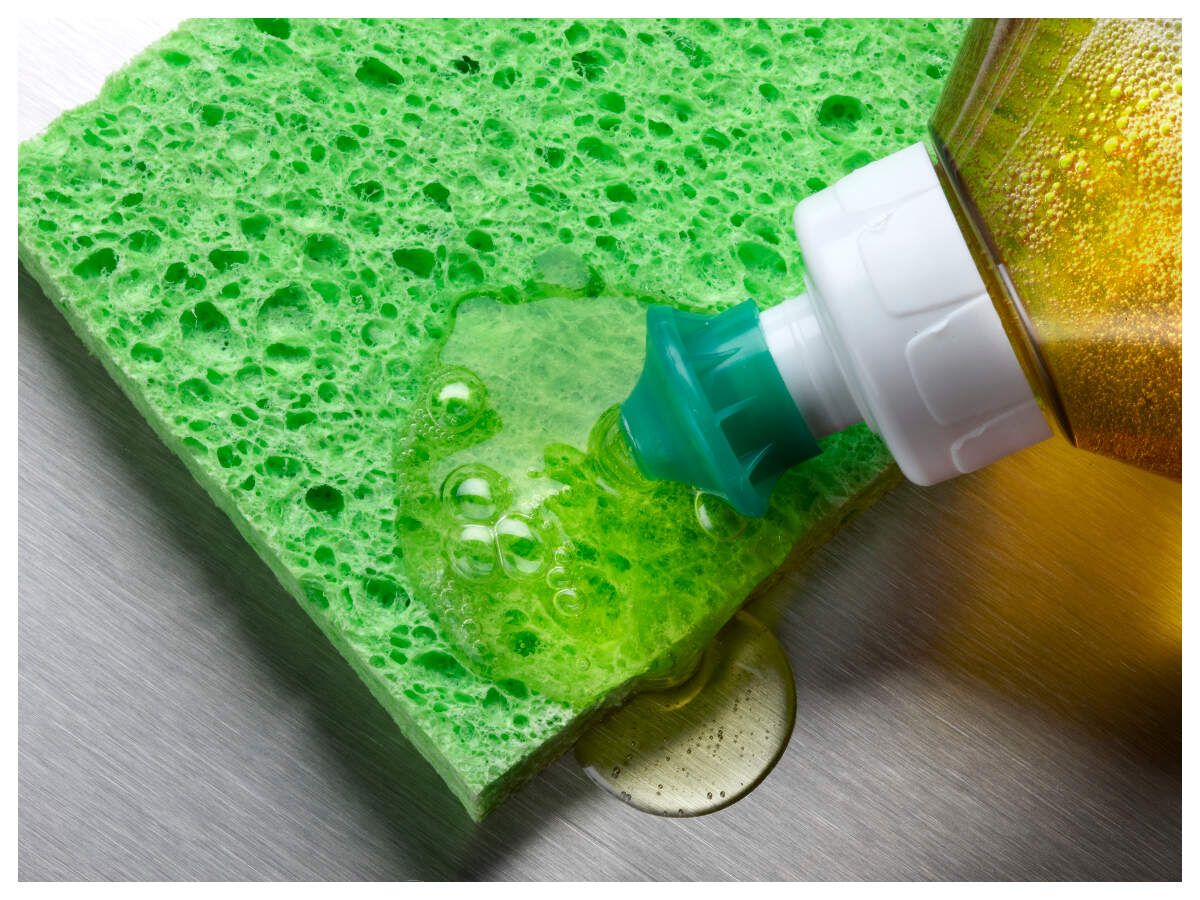
MANGALURU: Ramakrishna Mission in line with Kannada adage Kasadinda Rasa is all set to extract "juice" from wet "waste" with this coastal city’s first start-up dedicated for handling wet waste – Mangala Resource Management Institute. Spurred by havoc wrought by massive landslide of city’s waste from its landfill site at Pachchanady on to Mandarabailu at its foothills last monsoon, the start-up is striving to ensure zero wet waste reaches landfill.
Based on the idea of pot-composting, the start-up will handle wet waste that apartments in the city generate daily. Each household in the apartment must pay monthly fee of Rs 150 and one-time deposit of Rs 1000, that will be returned at the end of third year. Volunteers of the start-up with deposit the household wet waste in the pot compost unit, cover it with layer of coconut husk and return the waste bins that will be given with the unit to households.
The units will be placed in parking lots of apartments against pillars in an unobtrusive manner, noted Swami Ekagamyananda, convener of Swachh Mangaluru campaign that the mission ran in the city for five years from 2015. “The start-up is extension of the campaign and is response to queries from people who were keen to know what our next step of the campaign was," Swami Ekagamyananda, who announced the launch of start-up, on Tuesday, said.
The above start-up is also in response to directive from Mangaluru City Corporation (MCC) to all bulk generators of wet waste, including apartments with more than 20 dwelling units to handle it on their own or face penalty as per directive given by the National Green Tribunal, Swami Ekagamyananda, said. "Most of our queries were from resident welfare associations of flats with dwelling units exceeding the norm fixed by MCC," he said.
The pot composting unit has three made to design pots and comes with an iron guard. The start up will give two small plastic waste bins for the households to alternate their wet waste with the clean bin. Black soldier fly that are attracted to such waste convert it in to manure, which the start up is ready to buy back, he said. This novel start up will also ensure that the potters have ample opportunities to earn their livelihood by supplying pots, he said.
While Ramakrishna Mission had mooted the idea of pot composting as part of phase 4 and 5 of the campaign and had targeted to install pots in 4000 households, it received bookings for 4719 pots. The mission thus far has distributed 2800 pots and 2500 households are using it effectively, he said. “We are video graphing and archiving these success stories," he said, adding efforts are on to source pots from diverse vendors to meet this new venture.
Based on the idea of pot-composting, the start-up will handle wet waste that apartments in the city generate daily. Each household in the apartment must pay monthly fee of Rs 150 and one-time deposit of Rs 1000, that will be returned at the end of third year. Volunteers of the start-up with deposit the household wet waste in the pot compost unit, cover it with layer of coconut husk and return the waste bins that will be given with the unit to households.
The units will be placed in parking lots of apartments against pillars in an unobtrusive manner, noted Swami Ekagamyananda, convener of Swachh Mangaluru campaign that the mission ran in the city for five years from 2015. “The start-up is extension of the campaign and is response to queries from people who were keen to know what our next step of the campaign was," Swami Ekagamyananda, who announced the launch of start-up, on Tuesday, said.
The above start-up is also in response to directive from Mangaluru City Corporation (MCC) to all bulk generators of wet waste, including apartments with more than 20 dwelling units to handle it on their own or face penalty as per directive given by the National Green Tribunal, Swami Ekagamyananda, said. "Most of our queries were from resident welfare associations of flats with dwelling units exceeding the norm fixed by MCC," he said.
The pot composting unit has three made to design pots and comes with an iron guard. The start up will give two small plastic waste bins for the households to alternate their wet waste with the clean bin. Black soldier fly that are attracted to such waste convert it in to manure, which the start up is ready to buy back, he said. This novel start up will also ensure that the potters have ample opportunities to earn their livelihood by supplying pots, he said.
While Ramakrishna Mission had mooted the idea of pot composting as part of phase 4 and 5 of the campaign and had targeted to install pots in 4000 households, it received bookings for 4719 pots. The mission thus far has distributed 2800 pots and 2500 households are using it effectively, he said. “We are video graphing and archiving these success stories," he said, adding efforts are on to source pots from diverse vendors to meet this new venture.
Trending Topics
LATEST VIDEOS
City
 Students complain of 'Mass molestation' at Gargi college fest, Delhi Police and Principal face heat
Students complain of 'Mass molestation' at Gargi college fest, Delhi Police and Principal face heat  Won't be surprised if Kejriwal loses from New Delhi seat: Kapil Mishra
Won't be surprised if Kejriwal loses from New Delhi seat: Kapil Mishra  Jamia students-Delhi Police scuffle: Now cops appeal to protesting students
Jamia students-Delhi Police scuffle: Now cops appeal to protesting students  Anti-CAA march: Scuffle between Jamia students and Delhi Police; proctor urges students to step back
Anti-CAA march: Scuffle between Jamia students and Delhi Police; proctor urges students to step back
More from TOI
Navbharat Times
Featured Today in Travel
Get the app



